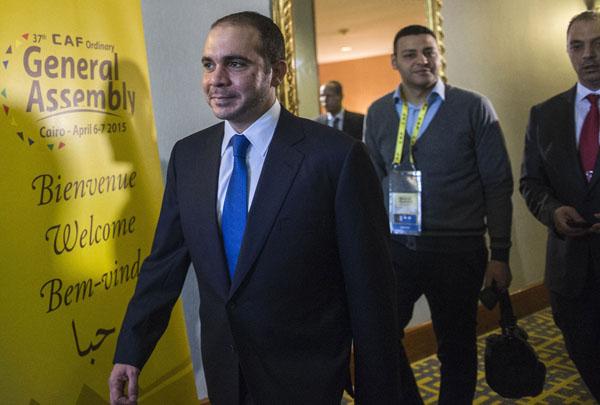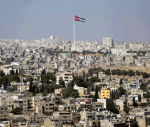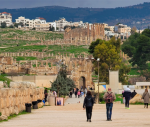You are here
Prince Ali expects sponsors to snub FIFA if Blatter stays on as president
By Agencies - Apr 07,2015 - Last updated at Apr 07,2015

FIFA presidential candidate HRH Prince Ali believes the scandal-hit organisation will struggle to replace sponsors and be damaged financially if Sepp Blatter remains in charge.
Five of FIFA’s top 14 sponsors decided in recent months not to extend their deals, leaving a void ahead of the high-profile qualifying draw event for the 2018 World Cup in Russia in July.
None of the departing sponsors, including Sony and Emirates airline, spoke out publicly against world football’s governing body. But Prince Ali has used his FIFA campaign manifesto, which was launched on Monday, to express concerns that corruption allegations around FIFA are putting off commercial backers.
“The damage which is being exacted upon ‘Brand FIFA’ has financial implications,” the FIFA vice president said in the manifesto. “Sponsors have begun to vote with their feet. If drastic action is not taken urgently to restore the image of our governing body, we can expect revenues to reduce and, in turn, monies available to national associations to also go down.”
FIFA said in January it was in “advanced negotiations” with potential partners for the 2018 World Cup, but no information on new sponsors have been announced since then.
“We should have a situation where sponsors are not only willing to come back but we should have sponsors fighting to sponsor FIFA,” Prince Ali said in a telephone interview with The Associated Press.
“Obviously I would like to see [the sponsors] back but we also like to see other options as well. It is important to have an organisation that has a good reputation that sponsors feel totally confident in.”
FIFA revenue topped $2 billion last year, adding $91 million to its reserves, which now stand at $1.523 billion after the World Cup in Brazil.
“FIFA is riding on the success of the World Cup,” Prince Ali said from Cairo where he is campaigning at a Confederation of African Football (CAF) meeting. “We could gain so much more if there was more faith and more trust in how FIFA is run.”
Prince Ali echoed his rivals by offering to redistribute more of FIFA’s funds to the 209 national associations, but he also guaranteed to help fund national stadiums in countries without them.
Prince Ali is one of three candidates trying to stop Blatter being re-elected for a fifth, four-year term in May along with Dutch FA head Michael van Praag and former Portugal international Luis Figo.
While not disclosing how much support he has, Prince Ali said: “I think the majority of national associations certainly believe that it’s crucial to have a change at this time for the sake of FIFA and the future of football.”
The 79-year-old Blatter has not released a manifesto or offered any plans for FIFA if a reign which began in 1998 is extended through 2019.
The centrepiece of Figo’s manifesto was a proposal to expand the World Cup from 32 to 48 teams, while Van Praag has suggested a 40-team competition in a bid to woo voters.
But Prince Ali said he would not make hasty pledges about expanding the World Cup just to win the vote of FIFA’s 209 national associations on May 29.
“My concern is [the World Cup] will be used by some to make promises that maybe they won’t even be able to deliver on in the future, but are using it for election purposes,” he said.
The 2026 World Cup is already on FIFA’s agenda, with a vote on the host being set recently for 2017. Prince Ali said he backs switching the competition between continents, which would boost an American bid as the CONCACAF region has not staged a World Cup since the US hosted the prestigious tournament in 1994.
“It is the world game and there should be rotation,” said Prince Ali, who is also open to countries from different continents co-hosting a World Cup.
Prince Ali is troubled by the fact FIFA sold the American television rights to the 2026 tournament to Fox without inviting other bids to avert possible legal action from the broadcaster over switching the 2022 World Cup in Qatar from June-July to November-December.
“There needs to be a proper tendering process and my big concern is that decisions have been made by people who probably won’t be part of the organisation by 2026,” he said. “And we aren’t talking about small money.”
Prince Ali, who didn’t use his royal title in the manifesto, highlighted FIFA’s need to be more transparent nine times in the document, including publishing the minutes of executive committee meetings.
Asked if those meetings should also be streamed online, Prince Ali responded: “That’s definitely an interesting concept.”
African allegiance
Every one of Africa’s 54 member countries will vote for Blatter in next month’s FIFA presidential election, the continent’s football boss said on Tuesday, referring to the 79-year-old Swiss as “dear Sepp”.
In front of Blatter’s three challengers, Issa Hayatou, president of the CAF, promised unanimous support in his speech to open CAF’s annual congress in Cairo.
“Africa is comfortable having you. Africa stays with you,” Hayatou said, according to a transcript of his comments provided by CAF.
Blatter was also present, and made a speech to the African football leaders in his role as FIFA president.
Although the individual countries don’t have to follow Hayatou’s directive, Africa is expected to be a strong base of support for Blatter.
With 54 of the 209 FIFA member countries eligible to vote in the presidential election in Zurich on May 29, Africa is the largest of the six continental confederations.
The praise Blatter received in Egypt contrasted to his uncomfortable reception at the UEFA congress last month, when his presidency was criticised by the three candidates standing against him, and some European officials.
Hayatou, a FIFA vice president and now an ally of Blatter after failing to unseat him in 2002, made an apparent reference to that UEFA congress on Tuesday.
“Dear Sepp,” he said. “I want to reiterate that here in Africa you are never on some strange or hostile territory. You shall always be at home here, on this continent.”
In his speech, Blatter reflected on Africa’s achievements during his time as FIFA president, including the continent’s first World Cup in South Africa in 2010.
His three challengers won’t be addressing CAF delegates like they did at UEFA’s congress. CAF said they were attending merely as “observers”.
Blatter said Cameroon’s Hayatou, who has led CAF for 27 years despite allegations of corruption and an official reprimand by the IOC, was a “pillar” of African football, according to CAF.
Long-term tenure
A vote to remove an age limit on CAF officials to allow Issa Hayatou to continue his long-term tenure as president of African football’s governing body was unanimously passed on Tuesday.
All 54 countries at the organisation’s congress in Cairo voted in favour of a proposal to change the statutes which previously stopped officials serving past the age of 70.
It was proposed that because FIFA does not have age limits, CAF should bring its rules in line with those of world football’s governing body.
The change comes at an opportune moment for Hayatou, who is now 68 but would not have been able to stand for another term in office in 2017 unless the rule was scrapped.
His current mandate ends in 2017 and he is seeking four more years until at least 2021, when he turns 75.
The rule change follows success in recent years in adapting the statutes to limit potential opponents to Hayatou’s rule.
CAF previously brought in a rule that candidates for its presidency can only come from the ranks of its own executive committee, a tight-knit club closely controlled by Hayatou. FIFA does not have the same restriction.
Hayatou, a former athletics official, is the longest serving senior member in FIFA structures, where he acts as vice president, and has had few serious challengers for power in Africa since first winning election in 1988.
Related Articles
FIFA presidential candidate Luis Figo on Wednesday disputed the Confederation of African Football’s (CAF) claim that all 54 votes from the continent will go to incumbent Sepp Blatter in the presidential elections next month.
Three men remain in contention to challenge Sepp Blatter for the FIFA presidency.
AMMAN – Reforms and the urgent need of supporting football federations across the world were the main objectives that attracted the attentio













